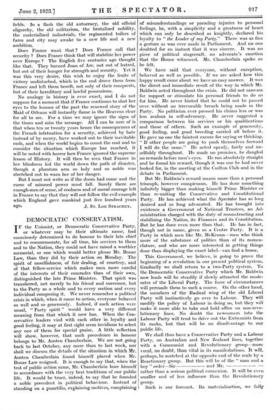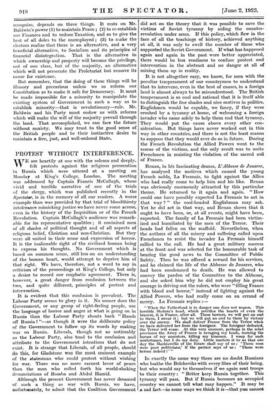DEMOCRATIC CONSERVATISM.
IF the Unionist, or Democratic Conservative Party, or whatever may be their ultimate name, had consciously determined to do honour to their late chief and to commemorate, for all time, his services to them and to the Nation, they could not have raised a worthier memorial, or one which would better please Mr. Bonar Law, than they did by their action on Monday. The spirit of unselfishness, of fair dealing, of courtesy, and of that fellow-service which makes men more careful of the interests of their comrades than of their own, distinguished the late Prime Minister. That spirit was transferred, not merely to his friend and successor, but to the Party as a whole and to every section and every individual composing it. We never remember a political crisis in which, when it came to action, everyone behaved so well and so generously. Indeed, if such action were usual, " Party spirit " would have a very different meaning from that which it now has. When the Con- servative leaders vied with each other in loyalty and good feeling, it may at first sight seem invidious to select any one of them for special praise. A little reflection will show, however, that such precedence in honour belongs to Mr. Austen Chamberlain. We are not going back to last October, any more than to last week, nor shall we discuss the details of the situation in which Mr. Austen Chamberlain found himself placed when Mr. Bonar Law resigned. It is enough to say that, when the test of public action came, Mr. Chamberlain bore himself in accordance with the very best traditions of our public life. It would be truer, indeed, to say that he founded a noble precedent in political behaviour. Instead of standing on a punctilio, explaining motives, complaining of misunderstandings or parading injuries to personal feelings, he, with a simplicity and a greatness of heart which can only be described as knightly, declared his loyalty to " the Leader of my Party." There was as fine a gesture as was ever made in Parliament. And no one doubted for an instant that it was sincere. It was no piece of political stagecraft, . no advocate's emotion that the House witnessed. Mr. Chamberlain spoke as he felt.
We have said that everyone, without exception, behaved as well as possible. If we are asked how this happy result came about we have an easy answer. It was the direct and immediate result of the way in which Mr. Baldwin acted throughout the crisis.. He did not canvass for support or stimulate his personal friends to do so for him. He never hinted that he could not be passed over without an irrevocable breach being made in the Party. No politician ever pressed his claims less or was less zealous in self-advocacy. He never suggested a comparison between his services or his qualifications and those of others. Such an example of generosity, good feeling, and good breeding carried all before it. He gave no one the faintest excuse for saying or thinking, " If other people are going to push themselves forward I will do the same." He acted openly, fairly and un- selfishly throughout. He made no promises, he dangled no rewards before men's eyes. He ran absolutely straight and he found his reward, though it was one he had never looked for, in the meeting at the Carlton Club and in the debate in Parliament.
But Mr. Baldwin's reward means more than a personal triumph, however conspicuous. He has done something infinitely bigger than making himself Prime Minister or than re-uniting the Conservative and Constitutional Party. He has achieved what the Spectator has so long desired and so long advocated. He has brought into existence a Government of National Trustees, an Ad- ministration charged with the duty of reconstructing and stabilizing the Nation, its Finances and its Constitution. But he has done even more than that. He has in fact, though not in name, given us a Centre Party. It is a Party in which men like Mr. McKenna—men who think more of the substance. of politics than of its nomen- clature, and who are more interested in getting things done than displaying the exact label—can find a home.
This Government, we believe, is going to prove the beginning of a revolution in our present political system. Gradually we shall return to a two-Party system. To the Democratic Conservative Party which Mr. Baldwin now leads will be steadily if slowly attracted the mode- rates of the Liberal Party. The force of circumstances will persuade them to such a course. On the other hand, the members of - the - Radical wing of the old Liberal Party will instinctively go over to Labour.. They will modify the policy of Labour in doing so, but they will make it more able to take and hold office on non-revo- lutionary lines. No doubt the newcomers into the Labour Party will tend to drive out the Extremists from its ranks, but that will be no disadvantage to our public life.
We shall thus have a Conservative Party and a Labour Party, on Australian and New Zealand lines, together with a Communist and Revolutionary group—more vocal, no doubt, than vital in its manifestations. It will, perhaps, be matched at the opposite end of the scale by a Reactionary group. But this will be of the " man and a boy " order—Sir and Mr. rather than a serious political connexion. It will be even smaller and of less influence than the Revolutionary group.
Such is our forecast. Its materialization, we fully recognize, depends on three things. It rests on Mr. Baldwin's power (1) to maintain Peace ; (2) to re-establish our Finances and to reduce Taxation, and so to give the best of all doles to the unemployed ; (8) to make the electors realize that there is an alternative, and a very beneficial alternative, to Socialism and its principles of financial disintegration. That is the alternative in which ownership and property will become the privilege, not of one class, but of the majority, an alternative which will not persecute the Proletariat but remove its cause for existence.
But remember, that the doing of these things will be illusory and precarious unless we so reform our Constitution as to make it safe for Democracy. It must be made impossible for a minority to manipulate the existing system of Government in such a way as to establish minority—that is revolutionary—rule. Mr. Baldwin and his Party must endow us with reforms which will make the will of the majority prevail through the land. That accomplished, we can face the future without anxiety. We may trust to the good sense of the British people and to their instinctive desire to maintain a free, just, and well-ordered State.











































 Previous page
Previous page